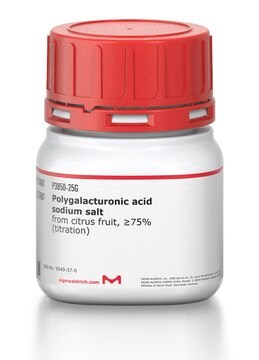P9416
TWEEN® 20
for molecular biology, viscous liquid
Synonym(s):
Polyethylene glycol sorbitan monolaurate, Polyoxyethylenesorbitan monolaurate
About This Item
Recommended Products
biological source
corn
plant (Palm)
plant (coconut)
wheat
Quality Level
grade
for molecular biology
description
non-ionic
Assay
>40% (GC)
form
viscous liquid
mol wt
~1228
~1228
composition
lauric acid, ≥40% (balance primarily myristic, palmitic, and stearic acids)
concentration
≥40.0% (GC)
impurities
RNAse, none detected
endonuclease, none detected
exonuclease, none detected
refractive index
n20/D 1.468 (lit.)
CMC
60 mg/L
solubility
water: 100 mg/mL, clear, colorless to yellow
density
1.095 g/mL at 25 °C (lit.)
suitability
suitable for molecular biology
foreign activity
Endonuclease-exonuclease and RNase, none detected
SMILES string
CCCCCCCCCCCC(=O)OCCOCC(C1C(C(CO1)OCCO)OCCO)OCCO
InChI
1S/C26H50O10/c1-2-3-4-5-6-7-8-9-10-11-24(30)34-19-18-31-20-22(32-15-12-27)26-25(35-17-14-29)23(21-36-26)33-16-13-28/h22-23,25-29H,2-21H2,1H3
InChI key
HMFKFHLTUCJZJO-UHFFFAOYSA-N
Looking for similar products? Visit Product Comparison Guide
General description
Surfactants, possessing both hydrophilic and hydrophobic components, fall into two main categories: ionic, which ionize in water (anionic, cationic, or ampholytic), and nonionic, which do not ionize. The discussed product is a nonionic surfactant with diverse applications such as emulsification, dispersion, solubilization, and detergent use. Additionally, it can serve as a solubilizer for membrane proteins.
Application
- As an emulsifying agent for the preparation of stable oil-in-water emulsions
- In pre-extraction of membranes to remove peripheral proteins (used at 2% for extraction of membrane-bound proteins)
- As a blocking agent for membrane based immunoassays at a typical concentration of 0.05%
- For lysing mammalian cells at a concentration of 0.005 to 0.5%
- Along with PBS in the dilution of antibodies in immunohistochemistry technique
- For washing cells in FISH (Fluorescence in situ hybridization) technique
Features and Benefits
- Highly versatile surfactant for your Life Science and Biochemical research
- Suitable for sensitive molecular biology research applications
- Tested for Endonuclease, exonuclease and Rnase′s
- Excellent solubilising, dispersing and emulsifying agent
Caution
Preparation Note
Other Notes
Legal Information
comparable product
Storage Class Code
10 - Combustible liquids
WGK
WGK 1
Flash Point(F)
527.0 °F - Pensky-Martens closed cup
Flash Point(C)
275 °C - Pensky-Martens closed cup
Personal Protective Equipment
Certificates of Analysis (COA)
Search for Certificates of Analysis (COA) by entering the products Lot/Batch Number. Lot and Batch Numbers can be found on a product’s label following the words ‘Lot’ or ‘Batch’.
Already Own This Product?
Find documentation for the products that you have recently purchased in the Document Library.
Customers Also Viewed
Protocols
cAMP Assays protocol from cold spring harbor
In Situ Hybridization of Whole-Mount Mouse Embryos with RNA Probes: Hybridization, Washes, and Histochemistry
Related Content
Three-dimensional (3D) printing of biological tissue is rapidly becoming an integral part of tissue engineering.
Our team of scientists has experience in all areas of research including Life Science, Material Science, Chemical Synthesis, Chromatography, Analytical and many others.
Contact Technical Service







